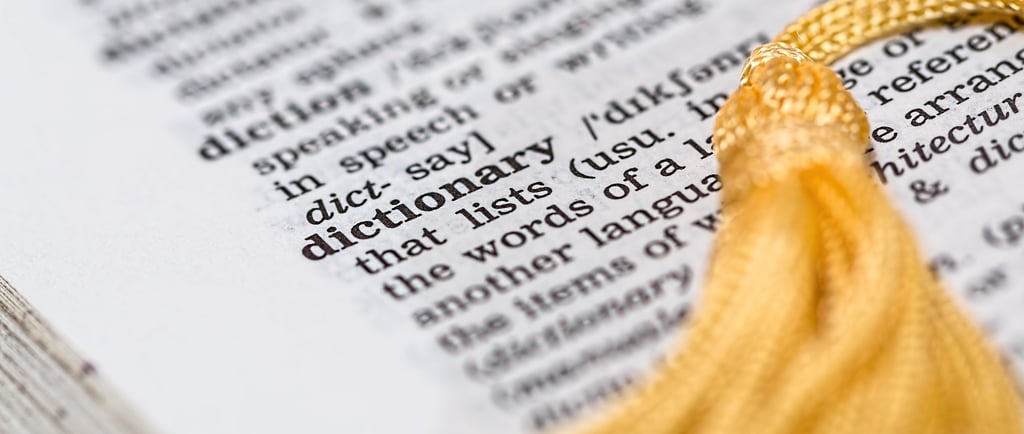📝 Keeping Track of Words - The Journey of the Dictionary 📖
📖 A follow-up story that connects the Language Chapter named THE HISTORY OF WRITTEN LANGUAGE and the History Chapter names INVENTION AND DISCOVERY ✨ This story invites children to explore the fascinating journey of one very thick book in the environment: the dictionary—how words were first spoken, recorded in symbols, and eventually collected into books. 📜🔤 From ancient scribes etching cuneiform onto clay tablets to the invention of alphabets and the great lexicographers who shaped modern dictionaries, this story weaves through human ingenuity in organizing language. 🌎📚 It also branches into the THE STORY OF COMMUNICATION IN SIGNS, showing how the need for communication and trade led to the evolution of writing systems. Just like other great human inventions, the dictionary continues to grow and adapt with new words being added all the time. As language keeps evolving, children are left to wonder: “What new words will be added to the dictionary next?” 🤔✨
HISTORY STORIESLANGUAGE STORIES
3/4/20255 min read


Have you ever bumped into a word that left you wondering, "What does that mean?" 🤔 Words are everywhere, and playing with them is fun! Throughout history, people have worked hard to invent, collect, organize, and write definitions that help us understand them all.
This big thick book I have here , the dictionary, is the great collector of words. The treasure chest of language, the keeper of meanings! But it wasn’t always neatly arranged on shelves. The story of the dictionary begins long, long ago, when humans first started speaking. 🗣️
The word "dictionary" comes from Latin and means “a saying”! This book is the keeper of everything that people have ever said!
You might remember from the story of communication and signs that our ancestors had a great task—to name everything they saw around them! But they did not write the words right away. People only spoke words. Knowledge was passed from one person to another through storytelling, songs, and memory. As people started living together, building villages and bigger communities, they realized something important: they needed a way to keep track of their goods and trades! People traded things and needed a way to remember what they gave and got. They also made lists, and even simple recipes! 🏺The oldest known word list of words comes from ancient Mesopotamia Map 1 Map 2👏Me-so-po-ta-mia 👏, over 4,000 years ago! These early lists tiny steps toward making a collection of words. ✍️ So, people started writing words on clay tablets, papyrus, and later, on skins or even on parchement. But how did they make word lists if they didn’t have an alphabet?
When they made lists, they didn’t use letters like we do today. Instead, they used hyroghylphs, cuneiform and other symbols. These symbols represented words or sounds. Sometimes, people even made lists showing how to say the same word in different languages! This was especially helpful for traders who needed to communicate across different cultures. Imagine being a trader and needing to buy or sell food in another country! How would you ask for potatoes, rice, coffee, or olive oil?
But there was a problem...With so many words being written down, how could anyone remember them all? What if someone read a word they had never seen before? What if they needed to know how to spell a word correctly? 😲 That’s when the idea of collecting words together was born!
Long ago, people loved making lists of words, but they didn’t have a proper book to keep them all in one place! It wasn’t until over 400 hundred years ago in 1604 that someone had a brilliant idea—to collect tricky words and explain what they meant. That’s when the very first English dictionary was created! A a schoolteacher from England named Robert Cawdrey , wrote A Table Alphabeticall, which listed hard words and explained their meanings. But, oh dear! He only collected 3,000 words, and many common ones were missing! Imagine opening a dictionary and not finding words like 'apple' or 'friend'—how confusing would that be? You know the word exists, but it's just not written in the dictionary! 😅
Over time, people realized they needed a better, bigger, more complete dictionary. Along came another boy from Englad with passion for collecting words! Samuel Johnson grew up surrounded by books and conversations, developing an incredible love for words from an early age. 150 years after the first collection of words he spend nine years of hard work and in 1755 he published A Dictionary of the English Language. He collected over 40,000 words and even included some funny definitions! One of his most famous was calling a lexicographer, let's clap it 👏 le-xi-co-gra-pher👏 that’s a dictionary maker with meaning “a harmless drudge.” 😂 That means someone who works very hard on something but doesn’t always get much credit for it. Imagine spending years writing a giant book and people just call you a ‘harmless drudge’.
But there was still more work to be done! People always love improving things and making them better, so a little over 100 years later, a group of word lovers joined forces, uniting their knowledge and efforts, to create the most complete dictionary ever. They knew that working as a team would help them collect more words, check their meanings, and make the dictionary as accurate and useful as possible! They collected words from books, letters, and spoken language. On February 1, 1884, the first volume of the famous Oxford English Dictionary (OED) was published. The full dictionary was completed in 1928! 📖✨And the journey didn’t stop there—new editions have been added over time, constantly expanding to include new words, meanings, and discoveries in language! The Oxford English Dictionary has grown so big that it can no longer fit into just one book! Imagine trying to carry it around—it would take 20 giant books just to hold all the words! 📚😲 And guess what? It’s still growing!
Let's open the dictionary and investigate its special parts! A dictionary has many features that make it so useful
📌 Entry Word – This is the word being looked up! 📌 Pronunciation – Shows how to say the word correctly. (Some dictionaries even spell it out in funny-looking symbols!) 📌 Part of Speech – Tells whether a word is a noun, verb, adjective, etc. 📌 Definition – Explains the meaning of the word. 📌 Etymology – Some dictionaries even share the etymology, showing how words have changed over time and where they originally came from!
Words are born every day, and the dictionary keeps growing like a big, endless book of words! Every word in the dictionary has a story—some came from ancient times, some were borrowed from other languages, and some were invented just yesterday! And guess what? In your own mind, you already carry a huge dictionary! A 10-year-old child knows around 10,000 words—imagine how many more you will learn as you grow! Language never stops evolving because humans never stop imagining, discovering, and creating. New words are added to the dictionary every year! Did you know “selfie” wasn’t in the dictionary until 2013? 🤳And some words disappear! Ever heard of “groak”? It used to mean “to stare at someone while they eat, hoping they’ll share.” 😆
🔍I wonder… what is the longest word in the English dictionary and how many syllables it has? Also, what is the latest word added to the dictionary? Or you can open the dictionary on a random page and check if you know all the words listed there.
Possible Follow-Up Ideas:
✍️ Creating a Class Dictionary – Can we make our own dictionary with fun and unique words?
📖 Create Your Own Dictionary! – Want to become a word collector yourself? You can make your own mini-dictionary by creating a booklet! Write down all the fun, silly, or interesting words you know and their meanings. Decorate your pages, add pictures, and even make up your own words! This way, you can have a special book of words that grows just like a real dictionary!
🌎 Be a Word Trader! – A fun activity could be to choose a word and find out how it is said in as many languages as possible—just like ancient traders did! Imagine needing to buy food in another country and figuring out how to ask for potatoes, rice, coffee, or olive oil in different languages!
🔡 Inventing New Words – What words can we create? How do words get added to the dictionary?
Everything in the world is connected, and the journey of words is just one small part of the great story of human knowledge! 🌎✨
With Montessori joy,
Vanina 😊

